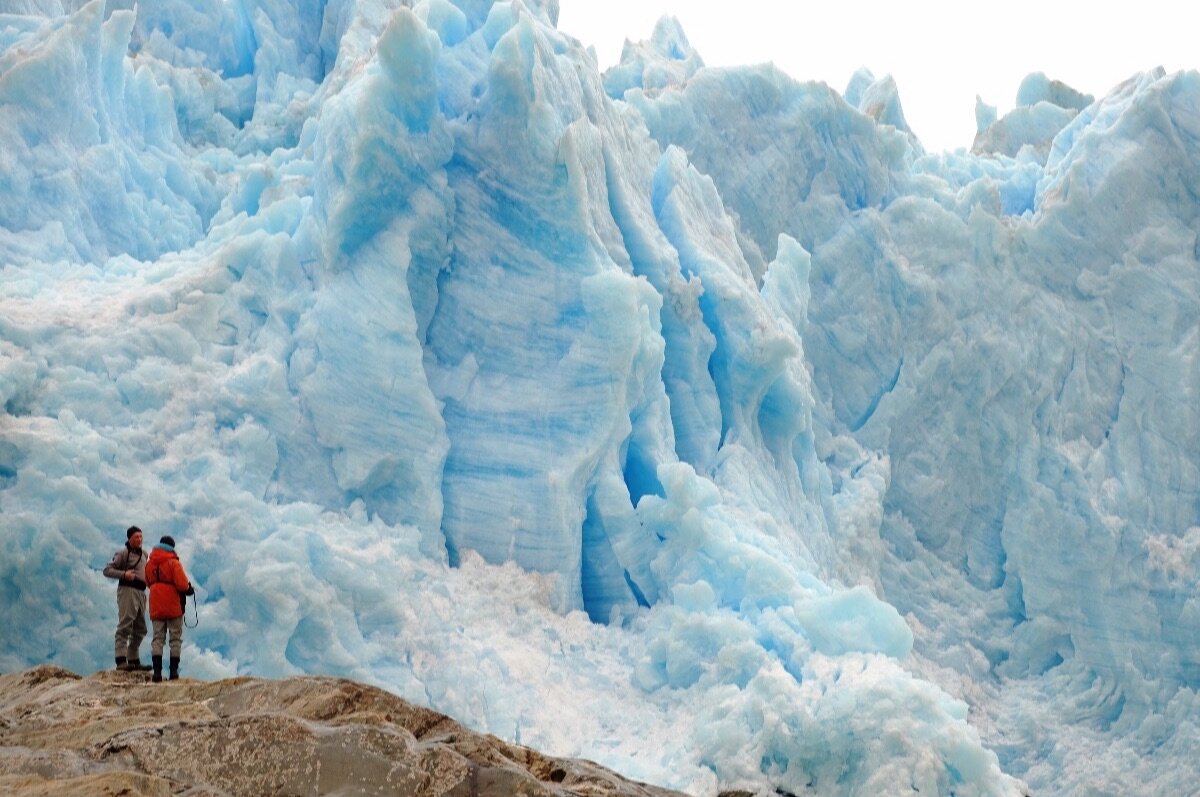June 2019
The average human life lasts 650,000 hours. How will you spend yours?
Finding solitude while on assignment at the Brujo Glacier in remote Southern Chile.
Life Is Short. Let's Maximize Our Fleeting Time on Earth.
Welcome to the 650,000 Hours newsletter! Each month, I’ll be sharing stories on travel, inspirational people, and making the most of our 650,000 hours on Earth. I’d like to particularly welcome those of you who signed up after reading my recent story in National Geographic Traveler.
Here’s a quick explanation of the 650,000 hours concept. In 2009, when I was volunteering with Earthwatch in Ecuador, I met a British scientist named Ann. A few years before she became a globetrotting researcher, Ann had worked as an office manager for a government contractor. She’d always been interested in science, and then she read Bill Bryson’s book, A Short History of Nearly Everything. On page two, Bryson states that even a long human life only lasts about 650,000 hours. That number shook her. One day she was in a meeting, and she looked around the room, and she thought (in a very English way): Why am I giving you lot one of my hours? So at age 34 she went back to school, she studied ecology and wildlife conservation, and now here she was, romping around the rainforest, all because of that number—650,000 hours.
I’ve tried to remember that lesson. We don’t get a lot of time here. To quote the great American philosopher—Ferris Bueller—"Life moves pretty fast. If you don't stop and look around once in a while, you could miss it." And so this newsletter will focus on just that: How we can better engage with the world and make it a better place than we found it, while enriching our own lives (I’ll also be sharing updates on the 650,000 Hours digital series).
Let’s get started! —Ken Budd
See The World
Canyonlands National Park, Utah.
When I left my phone on a D.C. subway car, I lost hundreds of irreplaceable travel photos—but I gained something surprising in return. Here’s an essay I wrote about it for Washingtonian.
“Travel like a local” is a common tip, but “it’s terrible vacation advice,” writes Mari Uyehara in Bon Appétit. See why in this interesting contrarian piece.
Also worth a read: The late and much-missed Anthony Bourdain's five most underrated destinations, including places free of "oligarchs in Speedos" (Tim Wenger for Matador Network); how much it costs to volunteer abroad (Go Abroad); and my 13 tips for easing jet lag (AARP).
Live Your Best Life
The headline says it all: “How I Ditched My Phone and Unbroke My Brain.” In this fascinating New York Times story, writer Kevin Roose reveals how he said goodbye to apps, read more books, and focused more on his surroundings.
Fear of rejection can be paralyzing. To remedy that, author Marianne Power spent a month getting rejected every day, with unexpected results, in this story for Harper’s Bazaar.
Also worth a read: How to procrastinate productively (Julie Comptom, NBC News), why working with your hands might make you happier (Derek Beres, Big Think), and a program where homeless people live with local families for three to six months (Anna Scott, NPR).
Meet Amazing People
I ghostwrote the stories of four tough Americans in their 50s and 60s who work dangerous jobs. The as-told-to pieces appear on an AARP microsite, which won a gold award from the Society of Publication Designers in May and was nominated for a 2019 Webby Award for digital photography (congrats to Todd Albertson and Jane Clark at AARP). Check out these spectacular images and gritty stories.
Dana Marlowe’s life changed when she heard these four words: “Homeless shelters need bras.” Here’s a piece I wrote on this accidental activist (the founder of I Support the Girls) for my Everyday Heroes column in The Saturday Evening Post.
Photo of the Month
I shot this in Falcon Fjord in Patagonia with One Ocean Expeditions for an upcoming story in Private Clubs magazine. Thumping through the ice in a small zodiac boat was like riding aquatic bumper cars.





